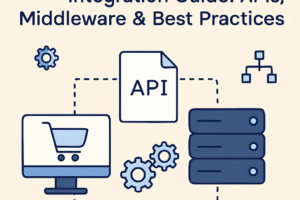In today’s digital-first world, mobile apps aren’t just for big brands anymore. Whether you’re running a small bakery, a large retail chain, or even a non-profit organization, having your own mobile app can give you a serious competitive edge. But here’s the thing: building a successful app isn’t just about coding—it’s about strategy, creativity, and understanding your audience.
This is where a mobile app development company comes in. They don’t just write code; they craft experiences, solve problems, and help you connect with your audience in ways that websites and ads alone can’t.
If you’ve ever wondered “What exactly does a mobile app development company do, and how can they help my business?”, you’re in the right place. Let’s dive deep.
1. Introduction to Mobile App Development Companies
A mobile app development company is a team of professionals—designers, developers, testers, and strategists—who work together to create apps for smartphones and tablets. Think of them as the architects and builders of your digital property.
2. Why Your Business Needs a Mobile App
Have you noticed how people spend more time on their phones than on any other device? A mobile app:
- Keeps your brand in their pocket 24/7
- Offers instant access to your products or services
- Builds customer loyalty with personalized experiences
In short, an app is like having a digital shop or office that’s always open.
3. Services Offered by Mobile App Development Companies
Most companies offer:
- App Strategy & Consultation – Turning your idea into a workable plan
- UI/UX Design – Crafting user-friendly interfaces
- App Development – Writing the actual code
- Testing & QA – Ensuring the app is bug-free
- Deployment & Launch – Getting it live on App Store and Google Play
- Maintenance & Support – Keeping it updated and secure
4. Native vs Hybrid vs Web Apps – Which Should You Choose?
- Native Apps – Built specifically for iOS or Android; offer the best performance.
- Hybrid Apps – Work on both platforms with one codebase; faster to develop.
- Web Apps – Accessible through browsers; cost-effective but less powerful.
Choosing the right type depends on your budget, goals, and target audience.
5. The App Development Process – Step by Step
- Idea & Research
- Wireframing & Prototyping
- Designing the UI/UX
- Development & Coding
- Testing & Quality Assurance
- Launch & Marketing
- Post-launch Support
6. Key Features of a Successful Mobile App
- User-Friendly Navigation
- Fast Loading Speed
- Offline Functionality
- Push Notifications
- Strong Security Measures
7. How to Choose the Right Mobile App Development Company
Look for:
- A solid portfolio
- Positive client testimonials
- Clear communication
- Flexible pricing models
- Post-launch support services
8. Cost of Mobile App Development
Costs vary depending on complexity:
- Simple Apps – $5,000–$20,000
- Mid-Level Apps – $20,000–$50,000
- Complex Apps – $50,000+
9. Common Mistakes to Avoid When Hiring
- Choosing based solely on the lowest price
- Ignoring post-launch support
- Not checking their past work
- Overlooking communication skills
10. Trends Shaping the Future of Mobile Apps
- AI Integration
- Augmented Reality (AR)
- Voice Search Optimization
- 5G Connectivity Enhancements
11. Case Studies of Successful Apps
Example: A local restaurant partnered with a mobile app development company to launch an ordering app. Within 6 months, sales increased by 35%.
12. Challenges in Mobile App Development
- Budget limitations
- Device compatibility issues
- Keeping up with OS updates
- User retention after launch
13. How Mobile Apps Boost Customer Engagement
Push notifications, personalized content, and gamification keep customers coming back.
14. Maintaining and Updating Your App Post-Launch
Your app isn’t a “set and forget” tool. Regular updates keep it secure, relevant, and compatible with new devices.
16. Conclusion
A mobile app development company can turn your vision into reality, giving your business the tools to engage customers like never before.
FAQs
- How long does it take to build a mobile app?
Usually 3–9 months, depending on complexity. - Can a mobile app work offline?
Yes, if designed with offline functionality in mind. - Do I need separate apps for iOS and Android?
Not necessarily—hybrid apps can work on both. - How often should I update my mobile app?
At least once every 2–3 months for security and performance. - Can a mobile app really grow my business?
Yes, by increasing customer engagement, loyalty, and sales.


